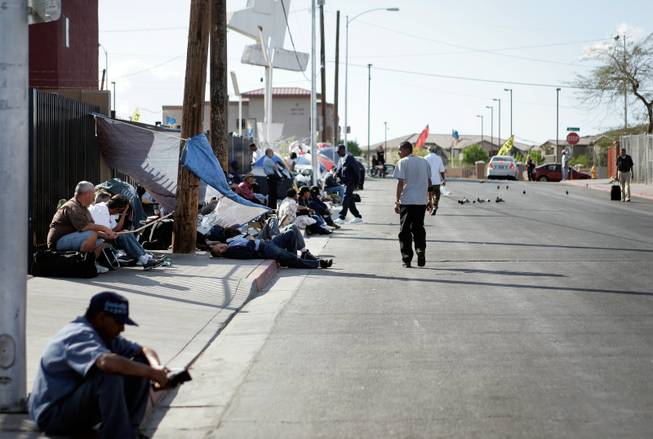
Homeless people camp inside tents and wait for social services on Foremaster Lane between Las Vegas Boulevard North and Main Street in Las Vegas on Thursday, April 2, 2009.
Thursday, April 9, 2009 | 4:25 p.m.
Sun Archives
- Growing homeless settlement vexes business, Goodman (4-3-2009)
- LV City Council addresses homeless issues (3-18-2009)
- Empty bowls help fill food pantry (3-14-2009)
- Volunteers seek out valley's homeless for census (1-29-2009)
- Fire at vacant house leads to homeless man's arrest (1-23-2009)
- Fire burns homeless man, woman trying to stay warm (1-15-2009)
- Volunteers turn out to help homeless (12-21-2008)
- Metro's homeless liaison still not hired (1-21-2006)
- Homeless people swept from downtown camps (5-6-2002)
Homeless people who struggle the most with disabilities and addictions are remaining on the streets, while many others are successfully entering transitional housing, a regional homeless expert said Thursday.
The Southern Nevada Regional Planning Coalition census, conducted by 500 volunteers in late January, found a 17 percent increase in the homeless population in Clark County this year — 13,338 people compared to 11,417 in 2007, when the last survey was conducted.
“What the data is showing is we have an increase in chronically homeless people,” said Shannon West, coalition regional homeless services coordinator. “Those on the streets, they are the folks with the most disabilities, most mentally ill, most addicted, the ones most struggling with those barriers.”
The chronically homeless are those who have a disability and have lived on the streets for more than a year or those who have had four episodes of homelessness in three years. This population costs the county the most for medical and social services.
To help the homeless, West recommends that groups partner with established organizations to provide food, clothing, shelter and jobs, rather than just handing out sandwiches in the homeless corridor, a tent city located at North Main Street, Owens Avenue and Las Vegas Boulevard North.
Church congregations can funnel resources into a program that mentors homeless families called One Congregation, One Family.
“If they want to help end homelessness, couple with homeless agencies that do that,” West said.
Joblessness in this ailing economy is cited as the principal reason for homelessness.
“That’s a reflection of our economy,” said Clark County Commissioner Rory Reid at a press conference this morning at the Clark County Government Center. “But there is some good news. The homeless count showed we’ve had some success in dealing with this problem as a region.”
The number of people living on the streets was down by about 19 percent, according to numbers released today from the countywide homeless census. The number of people living on the streets went from about 3,800 in 2007 to about 3,000 this year. Public and private agencies have expanded the number of shelter and transitional housing beds available over the last two years.
The hidden homeless count was 3,307, down about 14 percent over the last two years. The hidden homeless are those who are living on private property not intended as residences, such as those squatting in a foreclosed home, an abandoned building, a car or yard. This year, 1,000 households were surveyed. The coalition found it’s individuals who are hidden, and families are getting into the social services’ system faster.
Henderson Councilwoman Gerri Schroder said 67 percent of the homeless surveyed cited losing a job as the No. 1 reason for ending up on the streets.
The homeless veteran population fell from 25 percent to 18 percent this year.
“This may be attributed to the local efforts to place veterans in permanent housing programs, such as U.S. Vets,” she said.
A homeless veterans event on March 25 and 26 aided 589 veterans, a record-breaking number. The event attracted younger vets, including 12 Iraqi and Afghan war vets, Schroder said.
Las Vegas Mayor Oscar Goodman called on the private and public sector to “take them in our bosom” and help the homeless to enjoy a quality of life in Southern Nevada.
City Attorney Brad Jerbic was directed recently by the council to find a way to “nicely bring somebody into an environment where we can assist them,” Goodman said.
The mayor has received criticism for wanting to ship the homeless out of the city, away from the eyes of tourists, to a facility in Jean. He said that plan would have been successful but was killed by negative publicity of the city wanting to “imprison the homeless.”
Instead, he said, the Jean facility would be a place to let the homeless clean up, and provide them services and medical attention if suffering from physical or mental illness.
The mayor doesn’t support a homeless area, where the homeless would govern themselves, a method used in other large cities.
“I don’t like that. That’s almost like a ‘Lord of the Flies,’ where you give them an opportunity to be their own governing entity,” Goodman said. “To me, they wouldn’t be able to assist each other in the way they have to be helped.”

Join the Discussion:
Check this out for a full explanation of our conversion to the LiveFyre commenting system and instructions on how to sign up for an account.
Full comments policy